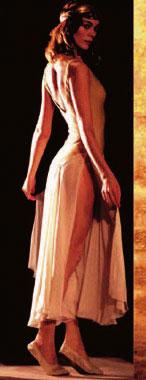Salome at the Gate Theatre

Known internationally for its productions of Samuel Beckett's searing works, Dublin's Gate theatre has also tied itself closely to those of Oscar Wilde, regularly producing faithful period versions and modern retellings of some of his greatest plays. It was with much promise and tremendous anticipation that the Gate once again joined forces with Alan Stanford to produce Oscar Wilde's Salome. Unsurprisingly it was a resounding success.
The Gate's production of Wilde's tragic, poetic masterpiece is as powerful as the dialogue within. Alan Stanford's staging is simple in its audacity. A lightly bare and sloped stage contains a single banquet table and piano pressed tightly at the back. The wings accommodate two bright silver seats and a reclining area with the centre strongly focused on the invisible cage of the prophet John the Baptist. The production's genius resides in the interaction of the piano's sumptuous chords and the light, graceful actions of the cast. From the outset, movement is portrayed as slow and rhythmic, weightlessly dancing to the piano's choral shifts while the language remains enunciated and drawn.
The very essence of the play is its use of language. There is a soft, poetic aspect to Oscar Wilde's writing and with Salome, he creates a work of worded art. The play glides from scene to scene, focusing intently on the poetic movements as they arrive through each character's potent monologue of visual adoration and passionate need. The audience is drip-fed tantalising morsels before dramatic, sudden shifts back to reality and dialogue. These poetic displays are the core of the play's brilliance: with each, the audience is riveted, transfixed in the glow of Wilde's astonishing verbal dexterity.
Steven Berkoff's direction is a masterclass in highlighting these instances. The pianist's gentle notes drift to a soaring quality as the characters' language grows ever-more urgent and captivated. Music composer Roger Doyle's original track is a sumptuous endeavor; utilised brilliantly by Berkoff, it infuses the stage with a visceral presence, highlighting the theme and capturing spectacularly the poetic drift of the monologues.
Central to this production are the characters of Herod and Salome. Alan Stanford assumes the mantel of Herod with his usual degree of tragic-comic integrity but opens up the character's eloquent monologues with equal mastery. Fiona O'Shaughnessy, direct from her role in RTE series Trouble in Paradise, reaffirms her theatric skills with a stunning and somewhat intoxicating portrayal of the capricious Salome. She glides across the stage in her elegant, luscious dance, enrapturing the audience and more importantly Herod and his young Captain, who both find it impossible to divert their gaze. While the entire cast displays excesses of talent, O'Shaughnessy and Stanford explore the play's rich language with particularly passionate performances.
The Gate has produced the year's finest theatre production thus far, bar none. An absorbing and richly-played affair, Salome's inspired use of piano and graceful dance incorporates the cast into the very essence of Oscar Wilde's most beautifully wrought play. One would be hard pressed to find a more perfectly produced, directed and acted rendition of any Wilde play. As a production company, the Gate has once again firmly set the standard, and it will be exciting to see if other companies measure up to its challenge.
